Message from the Leader

It is an honour to hold the position of Leader of East Devon District Council and therefore to have been asked to provide an introduction to this new Council Plan. It is the fruit of many hours of thoughtful work between the council’s members and officers, and enables both the democratic part of the council’s function and the administrative part to share an understanding and a practical vision.
I was aware when becoming Leader in May 2020 that there would be many legacy issues and I am pleased that members and officers have worked together to address a number of concerns. I am pleased that most of these matters have come to the fore because a new generation of councillors has engaged with the council to address them.
However, while legacy issues have to be dealt with, this council has also had to cope with the extraordinary work pressures caused by the need to respond to the pandemic, and all officers and members should feel highly satisfied that East Devon District Council has grafted above and beyond to sustain its services. There have been perfect storms, especially around waste and recycling, but the efforts to weather these have been magnificent, and our frontline workers in particular must also be warmly thanked.
This council has had to cope with the extraordinary work pressures caused by the need to respond to the pandemic, and all officers and members should feel highly satisfied that East Devon District Council has grafted above and beyond to sustain its services
Now we must look to the future, and the plan below sets out a practical roadmap to address the key priorities for the district which are, in essence, how can we make sure people have places they can afford to live, how can we conserve our magnificent environment, and how can we ensure there is the support and initiative in place to generate the employment opportunities to enable prosperity and economic security.
This Council Plan sets a course for the council to follow for the immediate future. It is imaginative but realistic as our finances, like so many other councils across the country are limited and this places limitations on how many of our aspirations we can deliver. We have quite rightly prioritised delivering on our promise to get more social and affordable homes built, as we face a housing crisis across the country. We have also prioritised our actions to tackle climate change, because if we don’t, as climate change champions say, there is no Planet B. And our third priority is to manage our finances and to budget in a responsible manner and to work to create a resilient local economy across the district.
I am in no doubt that a strong East Devon District Council working in close collaboration with county and other districts has the best chance of delivering on these priorities, and to take the opportunities which are perhaps going to arise from new regional investment from central government. Whatever the next few years may bring, close, respectful and collegiate cross-political-group work will be essential.
Our vision and values
Our vision is to make a positive difference to residents’ lives and our environment in East Devon.
The way we will make a positive difference to residents’ lives and our environment will be influenced by our values. These include:
- seeking continuous improvement of our high performing council
- listening to and learning from our residents and caring for them
- adapting as a council to new ways of working and refreshed priorities whilst recognising the pressure on resources
Our Vision and Values Commitment sets out more detail about our core vision and values and how they underpin everything we do.
Our plans
Our plans and strategies fit together so that everyone understands how their contribution fits in with the Local Plan and the Council Plan – we call this the ‘golden thread’. Our suite of plans and strategies includes service plans as well as a Homelessness and Rough Sleeper Strategy, Housing Strategy and a Climate Change Strategy.
How our Council Plan gives direction for the council’s work
Our Council Plan with its three priorities feeds into a category of delivery. This then feeds into a category of monitoring.
The category of delivery includes the Financial Plan, the Local Plan, council strategies and Annual service plans.
The category of monitoring includes budgets and the Financial Plan. It includes Council committees like cabinet, Overview Committee and Scrutiny Committee. It includes Performance Excellence Reviews and individual performance objectives for council staff.
Our priorities
Our vision is integral to our Council Plan and the delivery of it and we believe that East Devon District Council can achieve it through our three priorities:
-
Council priority one
Better homes and communities for all with a priority on the importance of good quality, affordable housing suitable in size and location. Poverty caused by the loss of employment, illness or disability is an increasing issue and will also be a high priority for East Devon District Council to tackle through all means available to us.
-
Council priority two
A greener East Devon, which prioritises issues arising from climate change and supports our natural environment. This issue affects and informs all of our objectives and services.
-
Council priority three
A resilient economy bringing prosperity to the district, notwithstanding the current challenging circumstances.
Council priority one Better homes and communities for all
We want to increase access to social and affordable homes as one of the council’s highest priorities.
We want to ensure better build quality of new homes, more social and affordable housing and a good standard of maintenance, to ensure homes are fit for purpose across all sectors. To us, delivering better homes is about far more than bricks and mortar; it is about using our resources and influence to keep people healthy and safe. It is about the quality of the setting of the homes, whether that is town, village or countryside and about the amenities, the open space and infrastructure that serve the houses and contribute to the wellbeing of residents.
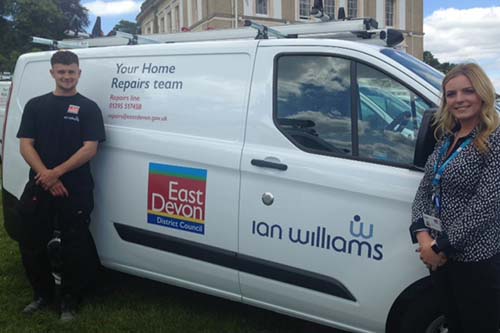
We believe that as the planning authority we have a crucial role to play in delivering better quality homes, ensuring the right homes in the right places and enforcing high build standards. Through our enabling activities, we intend to drive the delivery of much needed social and affordable housing. We will be pressing harder than ever for the ending of the Right to Buy which deprives the council of crucial housing stock.
As a council we also wish to reduce poverty and deprivation and intend to use our resources to achieve this.
Recognising the significant contribution of the voluntary sector to building community, we will seek to strengthen the sector and to support volunteering and the third sector.
A portfolio has been introduced to cover leisure and culture, recognising the importance of these sectors for our local economy, our communities, tourism and health and wellbeing.
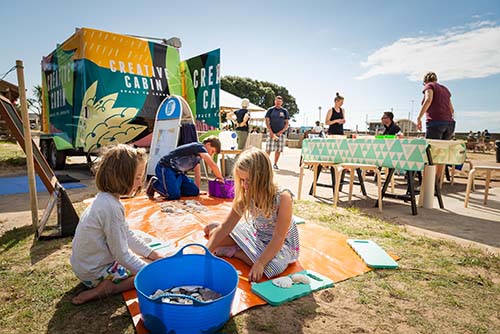
Our priority actions for better homes and communities for all
Promoting better homes and stronger communities
- Prepare and promote robust policies in our local plan to address the need for more and better quality homes and communities for all.
- Deliver more social housing and explore new ways to build more affordable homes.
- Deliver on the commitments in our Housing Strategy and Housing Service Plan.
- Implement our Homelessness and Rough Sleeping Strategy to assist those in greatest housing need, providing options through our own housing revenue account, by working with our partner housing associations (registered providers) and by responding to the consultation of Devon Homes relating to their banding of property and their assessment of those in need of housing.
- Promote Home Safeguard services and develop our supported housing offer.
- Ensure that council homes are well-managed, in good repair, fit for purpose and safe for our tenants and that we obtain high performance and value for money from our integrated asset management contract for repairs and maintenance and continue to invest in tenants’ homes, guided by stock condition data.
- Engage with and involve tenants in decisions affecting their homes and to improve communications between tenants, the council and its contractors.
- Apply for grants to promote energy efficiency and promote access to grants through greater publicity to residents of available options.
- Advise on and enforce standards in the private sector to attain suitable management and safety standards, including affordable warmth, houses in multiple occupation, mobile homes and private water supplies.
- Through our planning policies and the spending of Community Infrastructure Levy monies seek to secure the timely delivery of new infrastructure to support new development.
- Continue to work with our communities to support them in developing Neighbourhood Plans that reflect the community’s future aspirations and where those include community-led housing schemes work with them to progress their proposals through the planning process and towards delivery.
- Acquire a site to facilitate self-build plots and support their delivery.
- Research the ability for local communities to control the number of second homes in their communities.
Promoting health and wellbeing across the community
- Implement our Anti-Poverty Strategy, designed to reduce hardship and inequality in the district.
- Implement the actions contained in the Public Health Strategic Plan designed to improve public health, wellbeing and the quality of life of our residents.
- Ensure that our services and facilities are Covid‑19 secure and that the community support hub continues to be supported.
- Promote our natural environment, culture and leisure opportunities as part of our plans to deliver public health (including mental health) projects.
- Take forward the agreed recommendations of the strategic leisure review in a timely manner.
- Work with Devon County Council and the Devon Clinical Commissioning Group to ensure that a model of place-based care is in place to make the best use of the existing space in community hospital sites, the better to serve the communities of East Devon; this will reduce travel requirements to Exeter and assist in meeting the targets on carbon reduction as a by-product.
- Review our public toilet requirements, including their location, to ensure they are fit for purpose, working with town and parish councils.
- Ensure that developers pay the required contributions towards infrastructure through Community Infrastructure Levy and Section 106 agreements, and that where monies are available to be spent by the community, that they are supported by public engagement on spend and given easy access to funds.
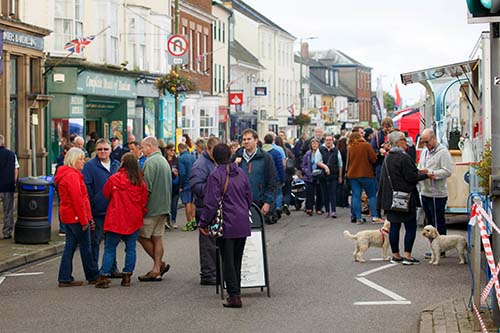
Promoting culture and community
- Develop a stronger commitment to and offers in arts and leisure through the development of a Culture Strategy and an Events Strategy for our own land.
- Encourage town and parish councils (and the third sector where appropriate) to protect and support their community spaces.
- Promote community wellbeing programmes through a culture and activities offer, led by the Thelma Hulbert Gallery, Seaton Wetlands, Wild East Devon, and expand our community development activities.
- Promote the links between arts and culture and climate change through the Creative Cabin and other initiatives, raising awareness of the public and seeking to change behaviours.
- Support communities through the transfer of appropriate community assets to towns and villages, enabling local communities to own, manage and develop assets in support of community aspirations and benefits.
Council priority two A greener East Devon
Our commitment to addressing the climate change and ecological emergency is a key priority for the council. Our focus will be on achieving carbon neutrality by 2040 and taking care of and enhancing our built and natural environment in our towns and villages, countryside and coastline now and for future generations. The details of this work is included in our Climate Change Strategy and Action Plan.
The council will change all its current working practices to reduce its carbon emissions to the minimum.
The objective for the whole district will be to work with all residents, businesses, and partners to:
- reduce greenhouse gas emissions from buildings through low carbon development and retrofitting
- apply for funding to encourage energy reduction and promote green energy
- implement carbon offsetting schemes within the district
- reduce further the waste generated and increase the percentage of recycling
- prepare the community for climate change so we can all become more resilient
In recent times, we have seen the value of green and open space for recreation and health and wellbeing. We shall be implementing re-wilding, nature recovery and conservancy schemes to enhance our precious environment.
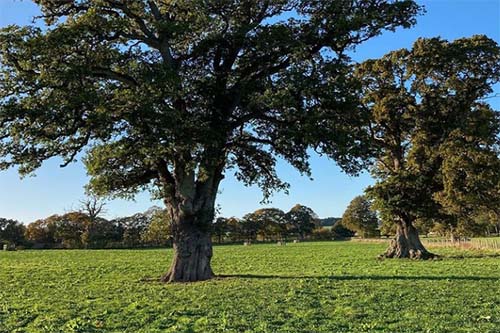
Covid‑19 has resulted in changes to work and lifestyle patterns in the district. We need to explore and understand the impact of new ways of doing things, such as working from home and the impact of online meetings on carbon emissions.
We recognise the importance of working with others on this journey; we will work with partners and contractors, town and parish councils, businesses, visitors and community groups to support them in reducing their carbon footprint.
Greener East Devon for us also means placing the highest emphasis on the natural capital of our stunning environment – coast and countryside – and the value and importance of biodiversity within it. As custodians for future generations, preserving and enhancing our natural environment is key.
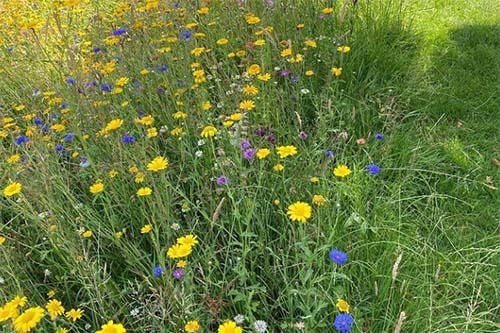
We want to provide a healthier, more beautiful natural environment that inspires, educates and involves residents and visitors to East Devon.
This commitment to greener East Devon comes at a price. It needs to be appropriately funded and resourced. However, we believe it to be essential for the future of our district.
Recently there has been a staffing shortage affecting our recycling teams, we have begun to address this and will keep it under review. We will also need to respond to any future contractual tipping point that could be triggered by further local property growth as this would lead to higher contract costs. We will also need to respond to anticipated government changes to the national recycling requirements that may affect our collection policy and costs.
Our priority actions for a greener East Devon
Carbon reduction
- Fulfil the actions and commitments in our Climate Change Strategy (aimed at reducing the council’s carbon footprint and that of our partners, contractors, businesses, communities, residents and visitors through green procurement, reducing carbon use in our supply chain and seeking to influence the businesses from whom we purchase) and update our Carbon Plan which will be the primary vehicle for delivering our intentions.
- Develop a Local Plan policy that protects the existing biodiversity and to improve and add to it significantly, to provide for communities to be more sustainable and provide improved interconnecting greener routes with cycle and foot ways.
Meeting high environmental standards
- Using the council’s investments and bank accounts to support the green economy.
Planning in our environment
- Work with landowners and developers to deliver habitat mitigation on-site with new developments or to provide mitigation close to the development site.
- Ensure that we are giving appropriate protection to our built heritage, including developing policies for the new Local Plan to continue to conserve and protect our listed buildings and conservation areas.
- Work with our communities to review our conservation area boundaries and their management plans, to develop a list of locally important heritage assets and progress the other actions in our Heritage Strategy.
- Develop planning policy to protect the nature corridors with new developments; protect and enhance our natural habitats, green spaces and the existing treescape across the district; increase tree planting and replacement schemes; review our tree management policies and promote best practice.
- Complete the review of the Playing Pitch Strategy and develop policies in the new Local Plan to protect existing playing pitches and support our sports clubs and communities to deliver new and enhanced facilities.
Promoting recycling and reducing waste
- Continuously strive to increase recycling rates and reduction of residual waste tonnages so we are amongst the highest recyclers nationally and the lowest council in England for residual waste disposal per household and continuing the promotion of the green waste collection service and home composting.
- Improve on street recycling including starting a programme of replacing older dog waste bins with dual mixed waste/recycling bins.
- Continue working with all district and unitary councils in Devon with a Keep Devon Litter Free campaign and other countywide recycling projects and explore ways to further reduce on street littering.
Protecting and enhancing our natural environment in coast and country
- Continue to develop our nature reserves including the award-winning Seaton Wetlands, and to work with landowners and groups on projects that will benefit to climate change and biodiversity net gain.
- Continue to work with partners to deliver the important Clyst Valley Regional Park.
- Address the risk of flooding and erosion by strengthening community resilience and extending flood prevention measures.
- Monitor carefully the progress of the Environment Bill 2020 and prepare appropriate plans to address the implications for East Devon District Council.
Council priority three A resilient economy
Covid‑19 has had a significant and detrimental impact on the economy of East Devon. Before the pandemic, the district was in almost full employment. Through the pandemic one third of employees across the district were furloughed and longer term the unemployment rate has been forecast to increase.
During the first half of 2020, over 1,000 jobs were lost due to companies going into administration or relocating, including the collapse of Flybe. Many jobs that have been lost have been high value and skilled engineering roles but just as many are in the lower paid sectors of our local economy.
We understand the shift in patterns of behaviour, including more working from home, and the importance of improving access to and the speed of broadband, especially in rural areas.
We have witnessed an increase in occupation of second homes through the move of people out of cities in response to the pandemic and the impact on our local economy and infrastructure.
We also recognise the impact on our town centres of the loss of footfall, through people working from home and the increase in the use of home delivery, rather than local shopping. This might require us to review our planning policies in relation to the conversion of retail and secondary shopping areas to residential or live-work use.
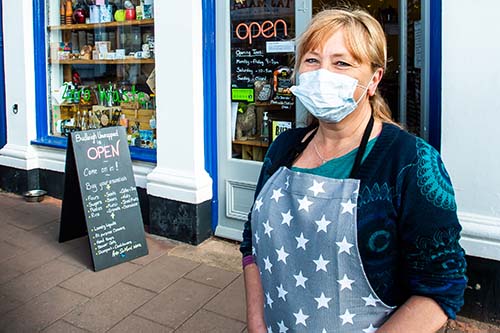
It is our overriding priority to strive for a resilient economy in order to promote prosperity and reduce hardship within the district. Not only will we seek to increase the levels of employment, but we will also seek to improve the quality of employment to raise wages levels across East Devon.
We will consider the use of our assets as a council and our planning policies to support regeneration and create employment opportunities.
We recognise the economic as well as the social value of tourism, art and culture to the local economy and the wealth that is generated in those sectors.
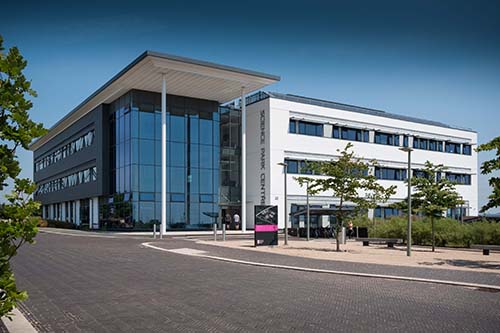
We also recognise the importance of working as a part of Team Devon in order to drive recovery for the East Devon economy. We will continue to promote the development of the Exeter and East Devon Enterprise Zone as key to the prosperity of our district.
Our priority actions for a resilient economy
Promoting the green economy
- Support working from home to reduce carbon emissions through unnecessary travel and facilitate the economic sustainability of our local towns and communities.
- Deliver a tourist strategy with emphasis on the on the green economy.
Our financial stability
- Maintain an active approach sourcing and securing available funds to help with asset management and the promotion of the district’s economy.
- Provide in-house commercial services such as pest control and food safety training that provide value for money to residents and local businesses, whilst creating new and valuable revenue streams for the council.
Supporting employment
- Work with the Department of Work and Pensions, regional and local partners to develop and co-ordinate an effective redundancy response network to respond to the serious economic challenges that the pandemic has brought to our district and our residents.
- Work with our Growth Hub to support local small and start-up businesses through free access to tailored advice and guidance, stepping up that support as businesses grow and develop and addressing barriers to business growth and innovation.
- Ensure that all our assets (including car parks) are used in the most effective way and that their development potential is evaluated to support employment and create economic growth and prosperity for all.
Supporting our local economy
- Develop the infrastructure needed to support our local economy, including transport and housing.
- Use the procurement power as a council to support local businesses.
- Provide support and advice to businesses through investment in our Environmental Health department.
- Explore the use of the doughnut economic model to guide policy and decision-making and ensure that ethical, socially responsible, and financially-sound decisions are made in an open, transparent and democratic manner.
Financial stability for a better future
We recognise that the Council Plan needs to be affordable. However, councils in England face acute financial challenges, especially as central government financial support for councils has been reducing over the past decade and demand for some services has been increasing.
The council’s Medium Term Financial Plan shows that existing service costs and expected income leaves a budget gap of £3 million in 2022/23 and a further gap of £1.2 million in 2023/24. This is against a net budget of £15.8 million. Difficult decisions will need to be made in respect of prioritising and delivering services and operating as an organisation.
In response to declining government grant, some authorities invested heavily in commercial property by borrowing via Public Works Loan Board loans in the hope that the rental yield would cover the loan costs and realise a profit to pay for services. However, over the last nine months, rental yields have plummeted. In some cases, this has resulted in the local authority being banned from any new expenditure except for statutory services. Fortunately, East Devon District Council has not had a commercial exposure to this extent, but despite government assistance regarding the impact of Covid‑19, we are still faced with challenges to balance the books for the foreseeable future.
Planning to address the identified funding gap has started, but we still need to look at ways of increasing our income and reducing costs to be able to sustain our current services, meet new requirements and needs and benefit from new opportunities.
We need to look at ways of increasing our income and reducing costs
Several our services are statutory like our recycling and waste collection. Other services are discretionary, but no less valued by residents such as public toilets and parks. Looking ahead the challenge is to get the balance right between the cost to residents and businesses and the benefits provided in terms of the quality of our environment, the health and wellbeing of residents and the strength and resilience of our local economy.
We also realise there will be a long-term impact of the pandemic on the local economy, both on businesses and on individuals, that will influence the council’s priorities, resources and services.
There are a number forthcoming decisions that impact on our budget. There is a refuse and recycling contractual tipping point that will be triggered by further property growth that will lead to higher costs plus the government changes to the national recycling requirements that may affect our collection policy and costs. We also need to implement the review of car parking charges plus and to install electric vehicles chargers to prepare for more green travel. Through 2021/22 we are undertaking a review into the provision of public toilets.
In the light of these pressures, we will need to focus on statutory services that we must deliver and discretionary services that the public value to help us to prioritise services through the Council Plan.
To deliver the vision through our Council Plan, we will refocus our resources and efficiently utilise our assets, invest to save and innovate, ensure a sound return on investment (both financial and social), keep our Council Tax within government guidelines and agree legally required balanced budgets.
We will identify new funding streams as they become available and ensure we bid for additional income where possible to secure the income needed to implement the Council Plan.
Where necessary we will lobby the government for changes in policy and funding so that we can implement our priorities, securing the resources required for delivery.
Conclusion of our Council Plan
This Council Plan sets out the district council’s strategic direction until the next elections in May 2023. It will guide officers and staff about council priorities and objectives, creating a framework to help plan and efficiently deliver great value and quality services to all residents, businesses and visitors.
This plan should also inform our residents, business, and partners about the council’s ambitions to evolve and improve. To do this, we have set out our three key priorities alongside our broader aspirations.
The council can, and will, deliver this Council Plan with the support and commitment of our dedicated staff and partners. This is only possible because each councillor, regardless of their political pedigree, has a single united desire to ensure that this council succeeds in all that it does to make East Devon a great place to live, work and play.
The council can, and will, deliver this Council Plan with the support and commitment of our dedicated staff and partners
This council cannot deliver on its Council Plan unless it has the necessary resources. We remain at the whim of central government funding and direction, which presents a problematic and constantly evolving situation. Therefore, the council must continually find new and more imaginative ways of raising additional funds and review how it can more efficiently manage all of its assets and resources. The following two years and beyond will subsequently remain financially challenging for this council.
Despite these challenges, we conclude this Council Plan with the firm commitment to strive, more than ever before, to turn our ambitions and goals into quality services and support for all East Devon residents and businesses.
About East Devon District Council
East Devon District Council is a local authority providing great value services to our local residents.
We are a council with no overall political control but a strong and productive coalition between the Democratic Alliance Group and Independent Progressive Group has formed an administration. The Leader, Councillor Paul Arnott, was elected as a member of the East Devon Alliance which is part of the Democratic Alliance Group within the council.
Our council comprises of:
- 30 Wards
- 68 Parishes
- 509 Council staff employees
- 60 Councillors
Our councillors
Each councillor represents the residents living within a ward in our district.
Our councillors are committed to making East Devon one of the best places to live and work in the district delivering the services that our residents value the most.
Find out more about East Devon’s councillors
Find out more about the great place we service in our Knowing East Devon profile
Our services
We are proud of the wide range of services that our council delivers whether by itself or in partnership with others. We are especially proud of our staff’s continuing and additional delivery of services over recent challenging months during the global pandemic.
We are proud of the wide range of services that our council delivers whether by itself or in partnership with others
We have good news to share about how well we do as a council in recycling waste and delivering other services. We are the custodians of ten nature reserves and responsible for the South West Coast Path in our district and the East Devon Way.
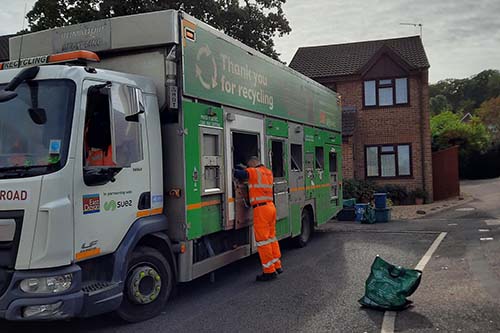
We are also proud of our external accreditation – our Green and Blue Flags, our platinum award from Investors in People – and we strive for continual improvement beyond what has already been achieved. This means operating at the highest level as an organisation – to deliver excellent services first time and every time.
East Devon District Council will improve communications to highlight the services we provide and what we do as a council, including the day-to-day work of our staff for our residents.
Our services range from the delivery of grants and benefits on behalf of the government through to environmental health, street cleansing, toilet provision, Award-winning parks, beaches and open spaces, recycling and waste collection. They are visible and make a big difference to the quality of life and the attractiveness of our local environment.
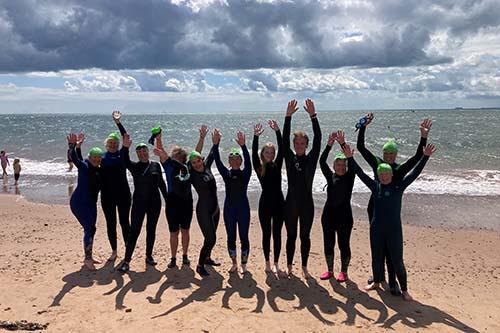
Behind the scenes we also deliver so much more; complex and bespoke engineering projects typically linked with climate change and based around flood protection; a planning department that determines applications large and small and oversees building control; leisure services to meet the needs of East Devon residents through our partners in LED Community Leisure; cultural services both independent of and in conjunction with LED and a finance department that efficiently supports our customers, some of whom may be struggling financially.
We strive to evolve continually for the benefit of all our residents now and in the future
We strive to evolve continually for the benefit of all our residents now and in the future. This will require us to consider how we maintain and fund our assets such as toilets and car parks, which matter to the public. It also will require us to consider how we fund and deliver services in future, especially in the light of the recovery from the pandemic, the climate emergency and changing demographics, patterns of work and emerging technologies. We also will need to be clear about the capacity we have and the financial pressures facing local government, and be alert to securing new sources of funding and exploring new opportunities to secure resources for our activity.
External evaluation matters to us and we will continue to value that especially where it, as often is the case, provides positive endorsement of our services, processes and staff.
In support of our three corporate priorities and behind the scenes we will:
- improve our communications with residents so that they are better able to contact elected members and officers, find out information about the council and access the services we provide
- look after our exist assets, expanding access to them and improving the return on the council’s investment in them, giving both value for money and providing social value to our communities
- review the services we provide, the performance and funding of those services and the partnerships we require to expand the services and deliver them and effectively as we can
- expand the resources available to support regulation and enforcement activity to ensure a good quality of life and a safe and attractive environment for our residents
- develop a new and enhanced performance management system to monitor the efficiency of our services
- explore innovative digital ways of consulting our residents to establish snapshot views in order to improve our services
- improve the customer experience of our telephone system based on customer and stakeholder feedback
- identify and implement improvements and upgrades to our website to enhance our digital offer and delivering more digital services so that customers can easily access reliable information and resolution of service requests
- provide responsive, effective and consistent communications through traditional media and social media
- listen to feedback via our residents’ vewpoint surveys and developing an action plan to improve our services
A year’s activity by this council
This is a snapshot of what this council did during the last year, 2020/21, despite operating in a difficult Covid‑19 environment.
- 6m+ Bin collections
- 158,036 Calls to Home Safeguard
- 154,056 Calls, emails and online chats to our customer service team
- 55,539 Calls to our revenues and benefit service
- 9,998 Repair jobs completed on our own housing stock of 4,000+ properties
- 4,875 Parking permits processed, totalling £579,170
- 2,685 Parking penalty charge notices issued
- 2,125 Planning applications processed
- 972 Pest control treatments
- 596 Food hygiene rating inspections
- 168 Affordable homes provided during 2020/21
- 289 Families housed
- 6thJoint highest place in the country for our Council Tax collection rate of 98.7%
- £134m+ Collected in Council Tax and business rates revenue
- £83.4m Distributed from April 2020 to July 2021 as Covid‑19 business grants. Processed 15,327 applications and approved 14,839.
- £36.9m Paid out in Housing Benefit and Council Tax Reduction to low‑income households
- £3.3m Received in revenue from car parking charges
- £590,000 Invested in new equipment for eight play areas
We delivered to residents and businesses by:
- maintaining over 1.5 million square metres of grass in our green spaces
- undertaking annual cliff inspections of over 8km of cliffs this included 1.1km of cliffs inspected by rope access to make seafront areas as safe as possible
- managing and maintaining 465 land assets, 434 buildings, 411 leases and licences, as well as collecting £0.9 million in rents from our assets and a general fund asset value of £103 million
- inspecting and maintaining over 177 public spaces to ensure they are safe for the public to use
- inspecting and maintaining over 80 play spaces to keep them safe and fun. These spaces incorporate multise games area, skate parks, large and small play areas and outdoor gyms, as well as places to learn, exercise and socialise.
- Thelma Hulbert Gallery taking their wide-reaching public programme Out and About into the community in their new Creative Cabin – a travelling space hosting creative activities, projects, talks, performances and workshops engaging over 3,000 East Devon residents and visitors including local families, primary and secondary schools and hard to reach groups
- Wild East Devon ran 120 events engaging with 1,313 people across East Devon and where able to provide 31 education visits, to a total of 721 young people
- Wild East Devon through social media have reached 857,269 individuals during this period, of which 93,466 people directly engaged with us – a 24% increase on the previous year